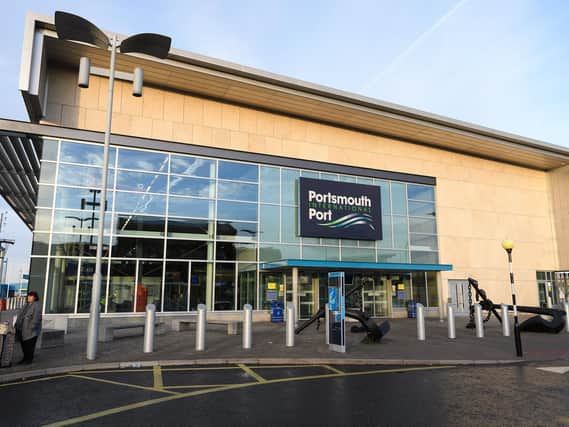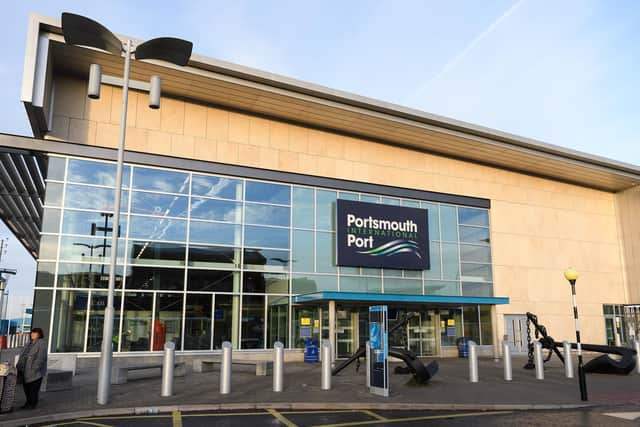These are the import tariffs Britain would impose in no-deal Brexit and how they would affect Portsmouth


The government announced that the UK would slash tariffs on a range of imports from outside the EU in the event of a no-deal Brexit.
However importers bringing fruit into the country via Portsmouth International Port would be subject to tariffs under the plans.
Advertisement
Hide AdAdvertisement
Hide AdPortsmouth currently imports 50 per cent of the bananas eaten in Britain and the fruit would be among the 13 per cent of imports subject to tariffs.


Other products which would be subject to tariffs under a no-deal Brexit include:
- Beef, lamb, pork and poultry and some dairy products, in order to protect UK farmers and producers from cheap imports;
- A number of tariffs on finished vehicles to support the automotive sector, which will not apply to car parts imported from the EU to prevent disruption to supply chains;
Advertisement
Hide AdAdvertisement
Hide Ad- Products including certain ceramics, fertiliser and fuel, where tariffs protect UK producers against unfair practices like dumping and state subsidies;
- Goods including bananas, raw cane sugar and certain kinds of fish, where tariffs are used to permit preferential access to the UK market for developing countries.
Under the plans, some products coming from the remaining 27 EU member states which are currently imported free of tariffs will now face levies for the first time.
Ministers said that, overall, the changes would represent a ‘modest liberalisation’ of the UK's tariff regime.
Advertisement
Hide AdAdvertisement
Hide AdUnder a unilateral temporary scheme announced by the Government, 87 per cent of all imports to the UK by value would be eligible for zero-tariff access - up from 80 per cent at present - while many other goods will be subject to a lower rate than currently applied under EU rules.
Following the defeat of the Prime Minister’s Brexit deal last night, Parliament will vote on whether to take no-deal off the table today.
In special arrangements for Northern Ireland, the UK's temporary import tariffs will not apply to EU goods crossing the border from the Republic.
If the UK leaves the EU without a deal on March 29, the temporary schedules will apply for up to 12 months while a full consultation and review of a permanent approach is undertaken.
Advertisement
Hide AdAdvertisement
Hide AdProposed tariff rates on a range of food products were announced as a proportion of the so-called ‘most favoured nation’ (MFN) currently imposed by the EU on imports from countries which do not have a free trade agreement.
Rates include beef (53 per cent of MFN), poultry meat (60 per cent ), sheep meat (100 per cent ), pig meat (13 per cent ), butter (32 per cent ), Cheddar-like cheese (13 per cent ), protected fish and seafood products (100 per cent ) and milled and semi-milled products (83 per cent ).
Tariffs on finished cars and trucks will be set at 10.6 per cent , down from the EU MFN rate of 11.3 per cent , while for finished buses the rate will remain unchanged at 12.6 per cent .
Other rates include 0.2 per cent on mineral products, 0.1 per cent on chemical products, 2.1 on fertilisers, 0.1 per cent on plastics and rubber, 0.2 per cent on leather and hides, 0.9 per cent on textiles and textile products, 0.3 per cent on stone and cement, 1.2 per cent on ceramics, 0.2 per cent on glass and 2.9 per cent on transport equipment.
Advertisement
Hide AdAdvertisement
Hide AdTrade Policy Minister George Hollingbery said: ‘Our priority is securing a deal with the EU as this will avoid disruption to our global trading relationships. However we must prepare for all eventualities.
‘If we leave without a deal, we will set the majority of our import tariffs to zero, whilst maintaining tariffs for the most sensitive industries.
‘This balanced approach will help to support British jobs and avoid potential price spikes that would hit the poorest households the hardest.
‘It represents a modest liberalisation of tariffs and we will be monitoring the economy closely as well as consulting with businesses to decide what our tariffs should be after this transitional period.’
